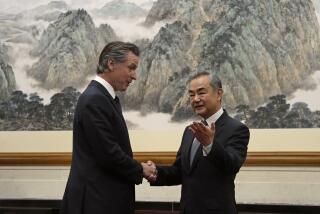Chinese Intern’s Visit Sets Off War of Words : NYSE, PSE Trade Trade Barbs Over Who Was First
- Share via
SAN FRANCISCO — Hu Yiming’s three-month internship at the Pacific Stock Exchange here was intended to promote cooperation and friendship between the sister cities of Shanghai and San Francisco.
That it appears to be doing. But besides symbolizing harmony, Hu’s visit has also managed to highlight the burgeoning international competition between the scrappy little Pacific exchange and its huge East Coast rival, the New York Stock Exchange.
The tempest in a teapot began in December when the Pacific exchange ballyhooed the 24-year-old Hu in a press release as “the first intern from the People’s Republic of China to train with a major U.S. exchange.”
The description, while true, didn’t sit too well with the Big Board’s vice president for communications, Richard Torrenzano.
Torrenzano, after all, did the advance work for and accompanied a 25-member delegation headed by his boss, New York Stock Exchange chairman John J. Phelan Jr., that went to China way back in November, 1986.
“We’re working with the Chinese on an internship program that is much broader in scope than what the Pacific exchange is doing,” he says. Under an agreement signed in 1986, the first Chinese interns will arrive in New York during the first half of 1988.
“The program we envision involves an awful lot of planning,” Torrenzano continues, adding pointedly that “we could easily have taken a single person and brought him over a long time ago.”
The response from California is clear and unambiguous: First is first. “Deep down, I think they are jealous,” gloats Maurice Mann, chairman and chief executive of the Pacific exchange.
During the internship, Hu will work on the exchange’s equities trading floors in San Francisco and Los Angeles, as well as its options trading floor in San Francisco. He will also do stints in the exchange’s data processing, compliance and marketing departments.
Hu, who studied international finance and is on leave from the Shanghai Investment & Trust Corp., says he expects to apply what he learns to his native land when he returns.
Not ‘Real’ Exchanges
Although the People’s Republic remains firmly planted in the Communist camp, China’s ambitious development schemes have created a voracious appetite for capital.
Under reform-minded Deng Xiaoping, the nation has launched limited experiments with capitalism in recent years, including the opening of securities exchanges in five cities--Shanghai, Beijing, Harbin, Shenyang and Tianjin.
But, as Hu notes, “these are not real stock exchanges.” Prices are regulated by the government, and trading is extremely limited. Shanghai, which once boasted the biggest stock market in Asia, has just three issues listed on its exchange. And, says Hu, “there are only buyers. When individuals buy stock, they never sell.”
Still, the reopening of securities exchanges is an important first step for a nation that sought to exterminate all vestiges of capitalism after the 1949 revolution. In Shanghai, for example, the stock market was surrounded by Communist troops in 1950, and many of those inside were hauled off to prison.
That, of course, was long before Hu was born. “Maybe they will decide to set up a (genuine) stock exchange in Shanghai, and I will be assigned to it,” says Hu, whose workday often begins before the market’s 6:30 a m. opening and stretches long into the afternoon.
Certainly, that is also the hope of the Pacific Stock Exchange. “The future of this exchange lies with the Pacific Rim,” says Mann. “If the kid becomes important in the Shanghai exchange, he’ll remember his time here and perhaps direct some business to us.”
Mann says he can envision the day when Chinese enterprises have stock listings on the Pacific exchange, and U.S. companies are traded in China.
Slang Confusing
Besides the time of its staffers, the exchange contributed $3,750 toward the cost of the internship. The rest is being picked up by the San Francisco/Shanghai Friendship Committee and Hu’s employer.
Hu’s tutors at the exchange call him “pleasant,” “bright” and “extremely patient.” And, while Hu’s English is good, “he is sometimes stumped by our peculiar industry lingo,” says Stephen M. Pettibone, a manager on the options trading floor.
Indeed, even the most diligent student would have trouble finding a dictionary defining such exchange shorthand as “teeny” (one-sixteenth) or “Geek” (Genentech).
Still, Hu says, “every day I learn a lot.” He is also awed by the millions of dollars worth of transactions that take place here every day. (Hu’s monthly pay in Shanghai, including bonuses, is 125 yuan--less than $35.)
Former Mayor Dianne Feinstein, who launched San Francisco’s sister-city relationship with Shanghai, says she has high hopes that internships like Hu’s will help her city, which has recently suffered business reverses.
“Outside of America, people make friends first and then do business later. That is especially true in Asia,” Feinstein says.
The globe-trotting former mayor credits sister-city relationships with Shanghai, Manila and Osaka with helping to lure foreign shipping lines to San Francisco’s port from Oakland’s across the bay.
“This relationship with Shanghai and the internship are very meaningful to the city of San Francisco,” echoes Mann of the Pacific exchange. Mann adds slyly: “If New York needs advice, we’ll be glad to counsel them.”
More to Read
Inside the business of entertainment
The Wide Shot brings you news, analysis and insights on everything from streaming wars to production — and what it all means for the future.
You may occasionally receive promotional content from the Los Angeles Times.










